It might surprise some of you to hear that I look forward to the Summer Olympic Games every four years, although not necessarily for all of the sporting competition that takes place. What I enjoy more than the sporting nature of the Olympics is the cultural showcasing of a nation that is expected, largely in the opening and closing ceremonies of the games.
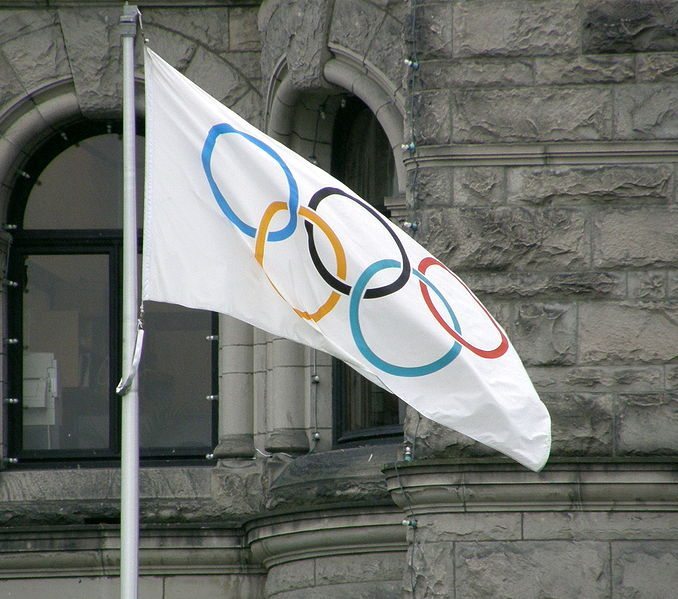
(Image: Mark Aristos, Wikimedia Commons)
One of the highlights of this, for any casual spectator, is of course the lighting of the cauldron. This is usually the closest guarded secret of the entire games; who will light it, what message is to be sent, where will the cauldron be, and what will it look like? From an artistic perspective, the cauldron has the potential to be one of the most beautiful and iconic parts of the games, which is perhaps why I take such great interest in it.
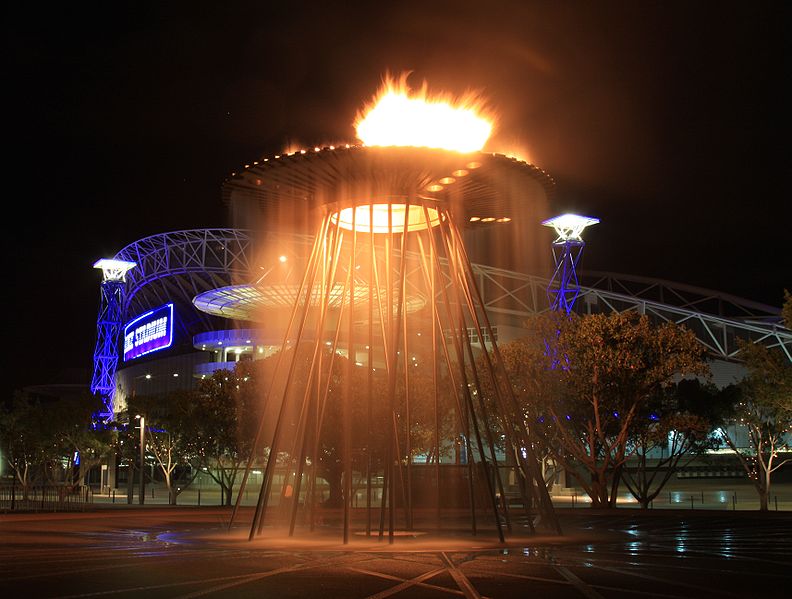
The Sydney Olympic Cauldron in its current home outside the stadium in Olympic Park, remodelled to immortalise the moment when it rose from a pool of water. (Image: Adam J. W. C., Wikimedia Commons)
Indeed, even for the non-artistically inclined, the lighting of the cauldron can be one of the most memorable moments of any Olympics. Who remembers a lot about the Barcelona Olympics in 1992?
I bet you remember the cauldron being lit by a flaming arrow, shot from an athlete’s bow. If you were watching the Sydney Olympic opening ceremony in 2000, you will surely remember gasping when you realised that the cauldron was actually submerged in the water, only to emerge and rise above the stadium.
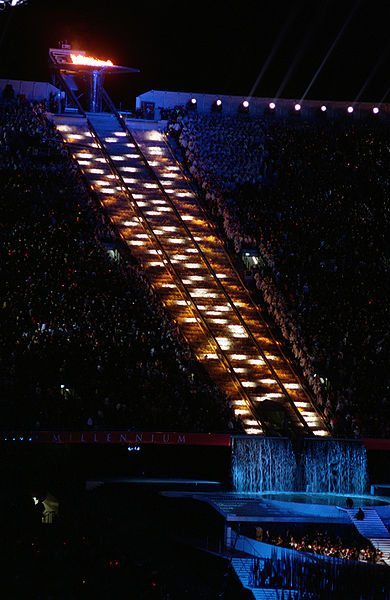
Sydney 2000 Olympic cauldron ascends the stadium (Image: TSGT Rick Sforza, Wikimedia Commons)
The Sydney cauldron was symbolic of modern Olympic cauldrons for two main reasons; first, the element of surprise. Remember Athens? Even though everyone knew the cauldron was that thing which looked like a reefer at the end of the stadium, no-one expected it to dramatically tilt downwards to meet the torchbearers.
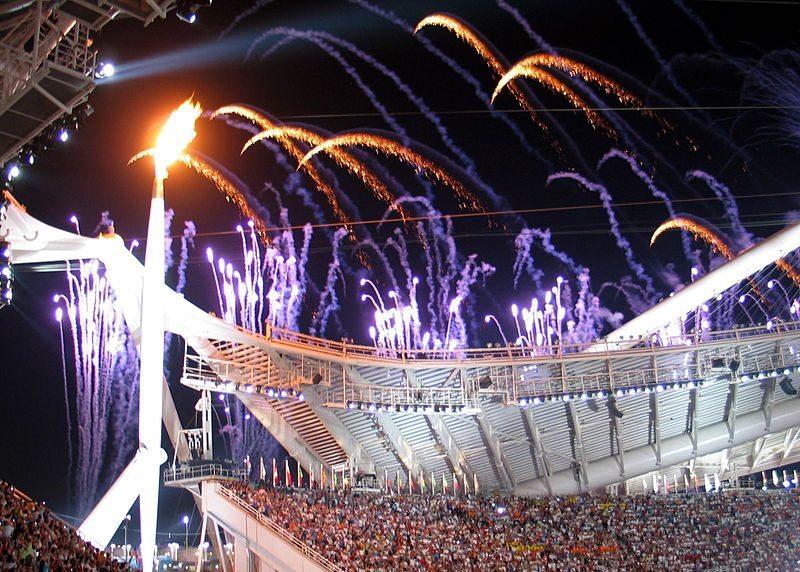
Athens’ Olympic Cauldron (Image: Alterego, Wikimedia Commons)
Or Beijing, where the cauldron was actually hidden over the stadium roof until the last minute, when it slid into place while people were distracted.
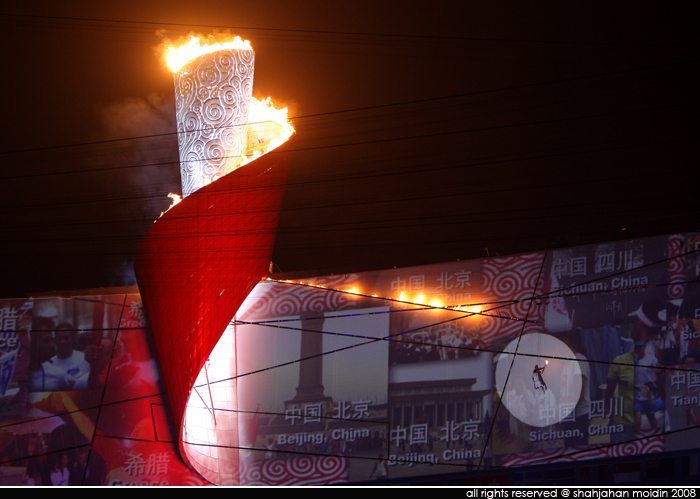
Beijing 2008 Olympic Cauldron (Image: Paparazzi, Wikimedia Commons)
Or London, when the ‘petals’ of the cauldron were right there before everyone’s eyes, before being beautifully brought together in the centre of the stadium.
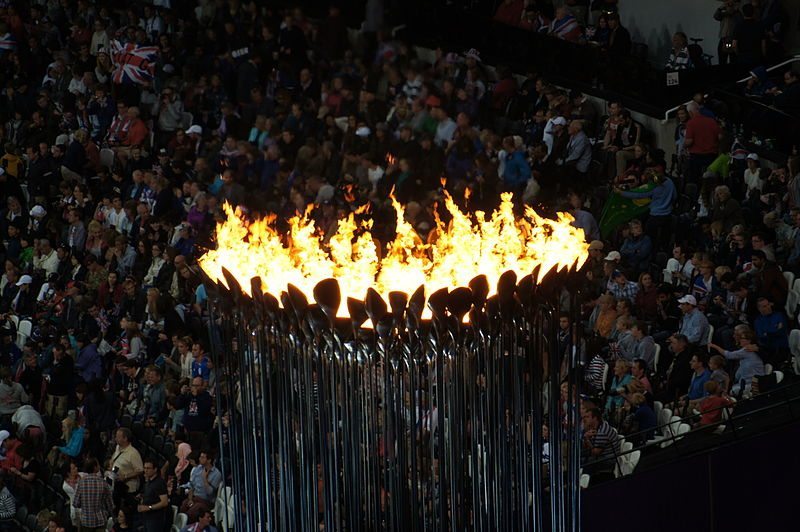
London 2012 Olympic Cauldron (Image: CDE Photos)
The Sydney cauldron was also symbolic for its malfunction, when the flaming ring refused to ascend the stadium for three excruciating minutes. There were also issues with Vancouver’s Winter Olympic Cauldron in 2010, when one of the ‘icicles’ didn’t emerge from the stadium floor.
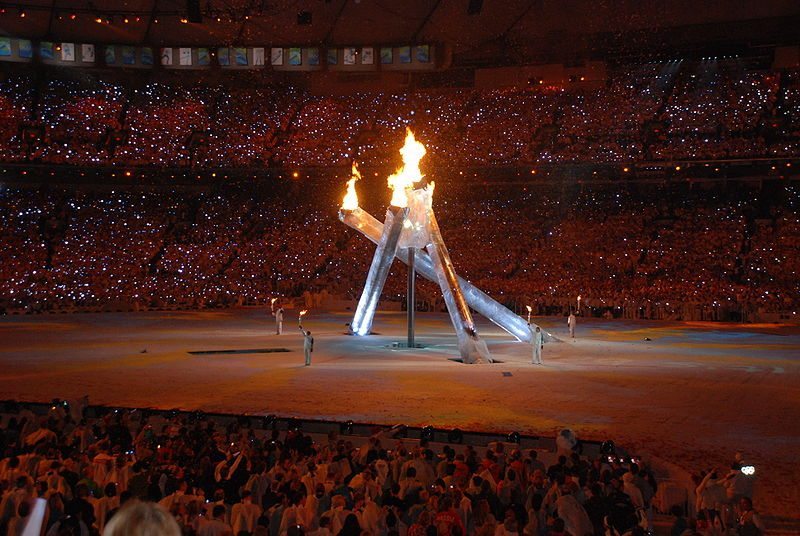
What’s wrong with this picture? Vancouver’s malfunctioning Olympic Cauldron in 2012
And some of you may even remember Seoul’s 1988 Olympic cauldron, where doves of peace had decided to sit, before being barbecued on live television at the moment of ignition. Yeah, really (see video below)…
So all of this brings us to the next summer Olympic Games, to be held in Rio de Janeiro, Brazil, this August. Where will the cauldron be? What will it look like? How will it be lit?
Contenders for the location of the Olympic cauldron include;
- the Maracanã Stadium, hosting the Opening and Closing Ceremonies, and the football finals
- the Engenhão Stadium stadium, which will host the Athletics events
- the Sambadrome, location of the finish line of the marathon
- somewhere in Olympic Park, where everyone can see it
- a remote location, like on Sugarloaf Mountain, or near Christ the Redeemer, where the whole city will see it.
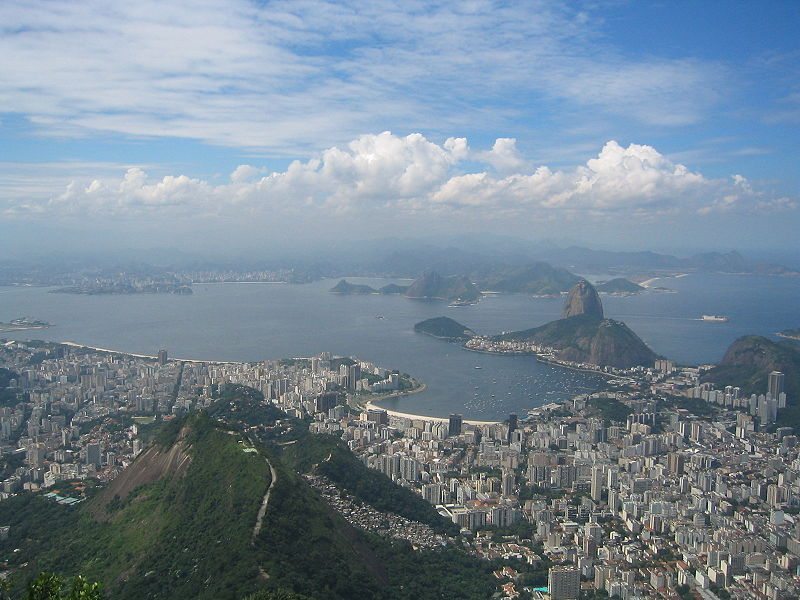
Some pointers when making predictions; tradition holds that the flame is;
- visible within the stadium where the Opening Ceremony is held
- visible, in some way, by the general public
- visible to track and field athletes
But also bear in mind that each of these ‘traditions’ has been broken at some point in the past, as creative license dictated – Sochi 2014 Winter Olympics’ cauldron was outside of the stadium, and London’s was at ground level inside the stadium, but visible to the public by a live television screen outside the stadium. And do remember that being Brazil, Rio’s football venue will be almost as important to local audiences, if not more so, than the athletics venue.
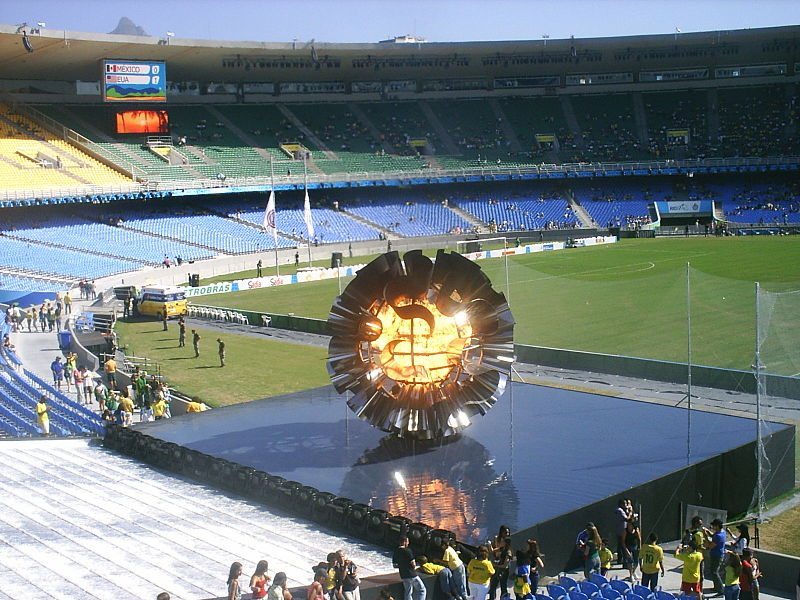
The cauldron at the Rio 2007 Pan American Games Flame at the Maracanã Stadium (Image: Redux, Wikimedia Commons)
Then the next question is where? Sugarloaf mountain, or near Christ the Redeemer would be iconic, but would be nowhere near Olympic Park (which, when all is said and done, is the whole point). In the 2007 Pan American Games, held in Rio de Janeiro, the cauldron was a kind of ‘burning sun’ inside the stadium; some theorised this was a nod to ancient, sun-worshipping Latin American cultures. Wherever it is, none of the stadiums, at the time of writing, sport anything resembling a cauldron, all of which raises the possibility of a “surprise cauldron” like Sydney, Beijing or London. But there are still nearly six months to go – and much can happen in that time.

Clockwise from top left;
1. Rio’s Olympic Park, under construction in early 2015, at Barra da Tijuca (Image: Tania Rêgo / Agência Brasil, Wikimedia Commons)
2. 2014 Carnival at the Sambadrome, venue for the marathon finish line (Image: Ben Tavener, Wikimedia Commons)
3. Maracanã Stadium (Image: Arthur Boppré, Wikimedia Commons)
4. Engenhão Stadium (Image: Dodoedo, Wikimedia Commons)
I’ll blog again when some more information comes to light – it might only happen on the night of the Opening Ceremony itself – but stay tuned! Meanwhile, if you’re really into this kind of thing, there is at least one internet forum speculating where and what the cauldron will be, and how it will be lit. This forum was started in August 2012 and as of 14th February 2016, has 180 posts about what might happen at the opening ceremony on 5th August 2016.

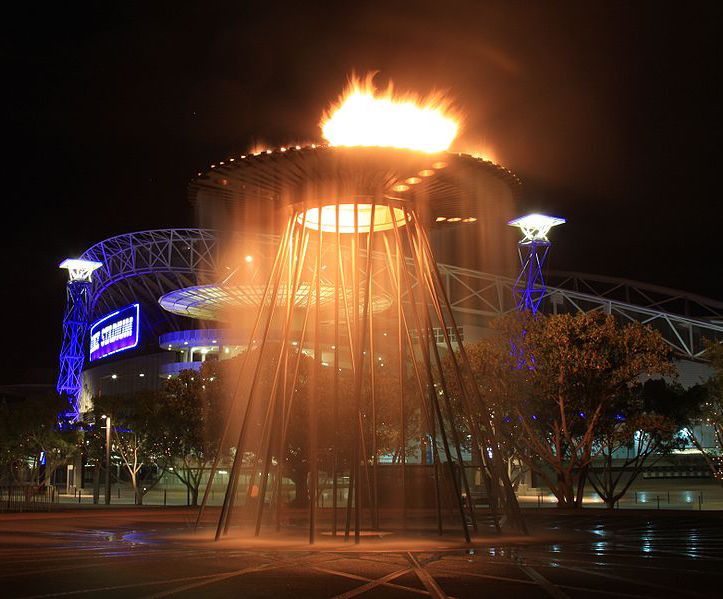
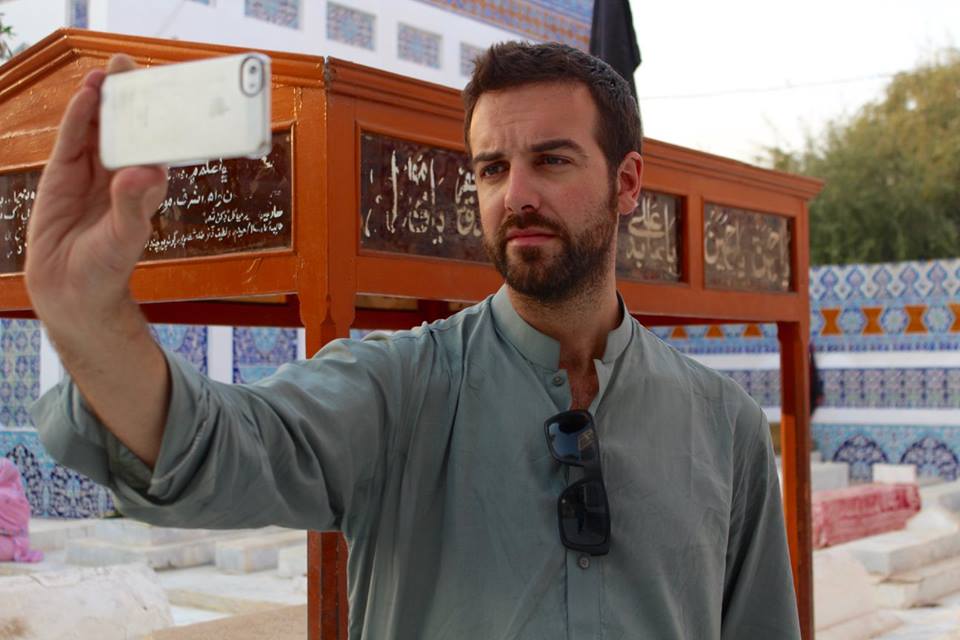
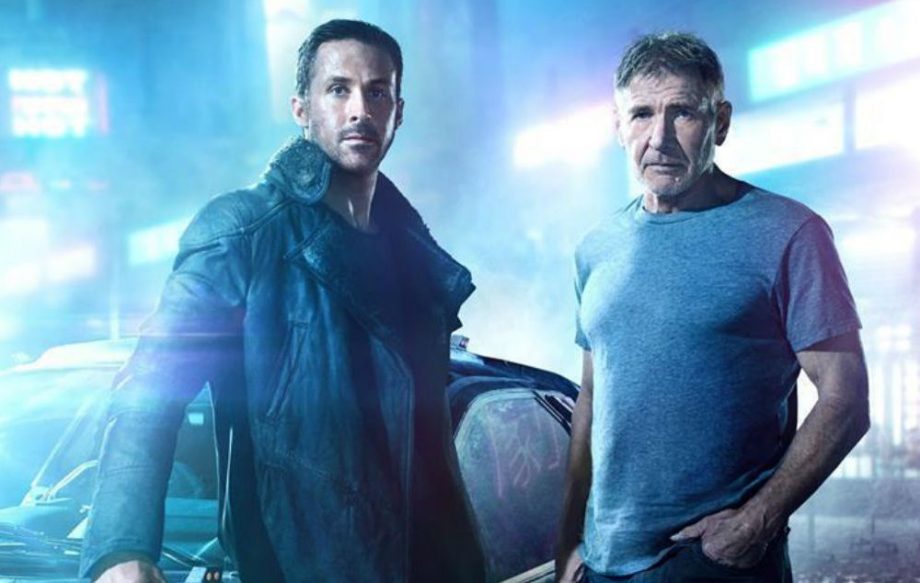
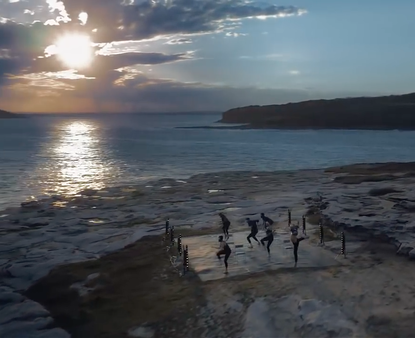
i must admit I dont really get into the Olympics. Apart from the ideals of people coming together from every country – that is a great thing. But I find all the races etc pretty boring… It will be interesting to see Rio after the Olympics!
Yeah it certainly will be – I can only hope that it has a positive effect on the city…
The cauldron will not stay in any stadium,for the first time in the Summer Olympics,they put,on Rio´s Port precint.This will be the first time on history that ocours on the Summer Games.The cauldron will be lit on Maracanã Stadium and after the opening ceremonies they will transfer to there on dawn when it will relight and after the Games this is your rest place.
It will be interesting to see what it looks like! Thanks for reading 🙂